MercoPress. South Atlantic News Agency
Tag: soybean
-
Monday, January 10th 2022 - 09:19 UTC
Lack of rain in southern states will reduce the Brazilian 2021/22 soybean harvest
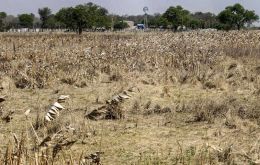
The hydric deficit and above-average temperatures in southern Brazil and southern Mato Grosso do Sul, prevailing since November have significantly damaged the 2021/22 soybean crop. Brazil’s estimated harvest has been lowered by 11.3 million tons to 133.4 million tons, according to a new survey released this week by AgRural.
-
Thursday, August 5th 2021 - 08:44 UTC
Brazilian farmers plan to expand soybean area; protein producers short of corn import from Argentina
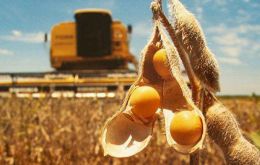
Brazilian farmers are planning to expand their soy area for the 15th consecutive year, according to a survey by consulting firm Datagro. The world’s largest soybean producer and exporter will increase the area sown by 4%, to 40.57 million hectares in the 2021/2022 season.
-
Thursday, July 1st 2021 - 09:30 UTC
Soybean rise to US $ 532 a ton in Chicago
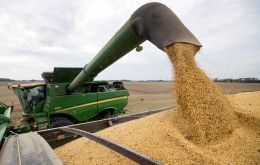
The price of soybeans sprang back to above US $ 500 in the Chicago market Wednesday after a US $ 33.2 rise fueled by a new report on stocks and planting from the Department of Agriculture of the United States (USDA).
-
Thursday, May 13th 2021 - 08:46 UTC
Will Argentina squeeze exporters as soybeans rise above US $ 600 in Chicago?
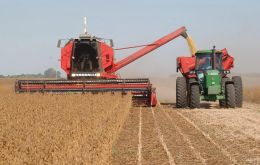
Argentine economists are eyeing the recent increase in the international price of soybeans as some sort of light at the end of the tunnel following a severe recession, high indebtedness amid the coronavirus pandemic.
-
Saturday, April 10th 2021 - 09:05 UTC
Paraguay grosses US $ 474 million in March for soybean exports

According to a report from Paraguay's National Customs Directorate (DNA) released Friday, exports of soybean and its derivatives bounced back in March up to 1.1 million tons, worth US $ 474.4 million.
-
Friday, March 5th 2021 - 08:25 UTC
Brazilian soy exports in March should reach 15 million tons: 250 ships waiting to load

Brazilian soy shipments this month should reach 15 million tons, which could establish a new record for a month, according to the maritime agency Cargonave, considering the 250 ships in the export line-up, a growth of more than 40% compared to the number seen in the same period last year.
-
Tuesday, January 5th 2021 - 09:36 UTC
Dry weather threatens southern Brazil and eastern Argentina
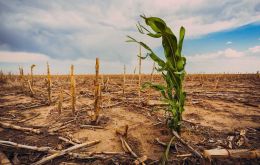
Dry weather across some of the major producing regions in South America is putting upward pressure on corn and soybean prices at the start the new year. Dryness is expected to continue through the short term across southern Brazil and especially in the main-producing states in Argentina.
-
Monday, December 28th 2020 - 08:30 UTC
Argentina's soy oil manufacturers and exporters unions' strike could end this week

Argentina's influential chamber of soy oil manufacturers and exporters on Sunday improved an offer to striking workers, seeking to end a more than two-week standoff that has bogged down exports from one of the world's main breadbaskets.
-
Thursday, December 24th 2020 - 08:30 UTC
Two weeks of industrial action in Argentina's soy crushers and export ports

Soymeal manufacturers in Argentina presented late on Tuesday a proposal aimed at ending a two-week strike by oil and port workers unions that has thrown a wrench in the flow of agricultural exports from one of the world’s main bread baskets.
-
Wednesday, December 16th 2020 - 09:08 UTC
Food companies and grocers urge commodity suppliers to refuse soybeans from deforested areas in Brazil

Some of the world’s largest food companies and grocers urged commodity suppliers including Archer-Daniels-Midland Co, Bunge Ltd, Cargill Inc and Louis Dreyfus Co. to stop trading soybeans associated with deforestation in Brazil’s Cerrado region, a savanna that is a hive of biodiversity and one of the country’s most important carbon sinks.
